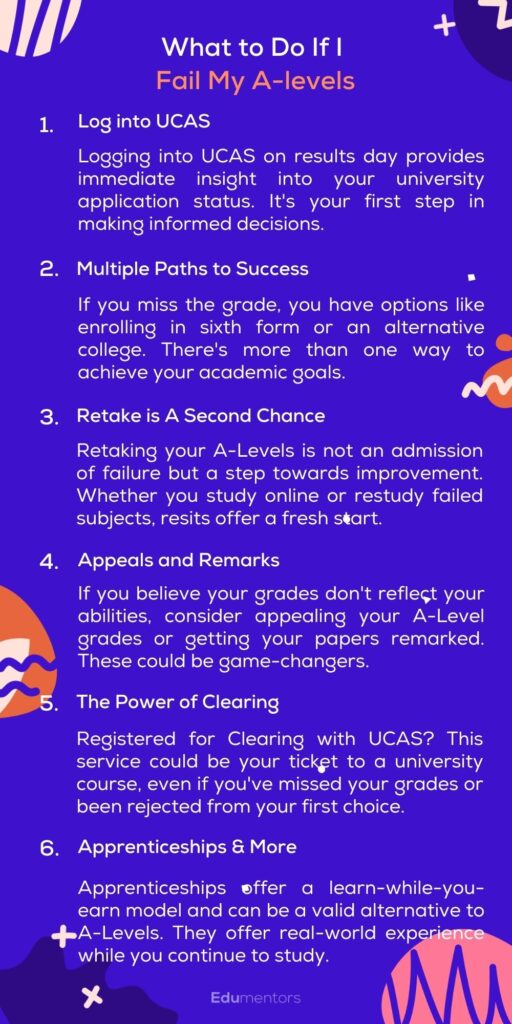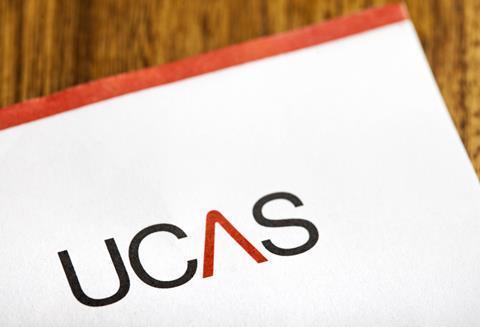The moment you open that envelope or log into your account and see that you’ve got Failed A-level or bad A-Level results, a wave of emotions can wash over you. You might feel like you’ve been plunged into an abyss of despair, uncertainty, and self-doubt. These emotions aren’t just fleeting feelings; they’re real and they’re heavy, encapsulating the emotional impact of what many consider a defining moment in their academic journey.
But let’s step back for a moment. Let’s breathe and consider the academic impact. Yes, A-level are a significant part of your educational history, but they’re not the only chapter in your life’s book. This blog is designed to be your guiding star, navigating you through the emotional rollercoaster and the academic maze you might find yourself in after receiving disappointing A-Level results.
So, if you’re reeling from the emotional and academic impact of failed A-level or bad A-Level results, read on. I promise, that by the end of this blog, you’ll see that this setback can be a setup for a great comeback.

What to Expect When Logged into UCAS
On results day, the air is thick with anticipation, nerves, and perhaps a hint of dread. One of the most crucial steps you can take to quell that uneasy feeling is to get logged into UCAS as soon as possible. The UCAS portal serves as the gateway to your future, providing real-time updates on your university applications and offers.
When you’re logged into UCAS, you’ll be able to see the status of your offers from different universities. Have you met their conditions? Are you still under consideration? Or have you been moved into clearing? All this information becomes accessible, offering you a roadmap of what steps to take next. If you find that you’ve been accepted despite your less-than-ideal A-Level results, congratulations are in order! However, if things haven’t gone as planned, UCAS can guide you through alternative options, such as clearing and retakes.
UCAS isn’t just a website; it’s a lifeline on results day that can offer clarity amidst the chaos. Therefore, make sure you’re logged into UCAS to get a comprehensive understanding of your academic standing and what paths are now open for you to explore.

Evaluating Your Options—Sixth Form, College, and More
So, you opened that envelope and you’ve realised you didn’t quite hit the mark; you miss the grade. First and foremost, it’s crucial to remember that missing your expected A-Level grades is not the end of the road. In fact, it could be the beginning of a journey you hadn’t considered, one that could be just as rewarding. When you miss the grade, a whole new set of options opens up to you, and in some cases, these options may suit you better than your original plan.
Sixth Form
For starters, sixth form is still very much an option. Many sixth forms offer opportunities for students to retake their A-level. If you were already in a sixth form, you might consider either staying there if they offer resits, or moving to another sixth form that has a proven track record of helping students improve their grades. Don’t underestimate the power of a change in environment; sometimes, it’s just what you need to excel.
Alternative college
Alternative colleges are also a viable path when you miss the grade. Unlike traditional sixth forms, alternative colleges often have more flexible curriculums and may offer a wider range of A-Level courses. If you found that the traditional academic setting wasn’t for you, an alternative college could provide the change in pace and style that you need to succeed in your A-level. These institutions often have dedicated support services and resources to help you focus on your weak areas.
Another option when you miss the grade is to reconsider your A-Level subjects. Perhaps your subject choices were not well-suited to your strengths. Both sixth forms and alternative colleges offer you the chance to switch your A-level, and sometimes a subject change is all it takes to turn academic disappointment into success.
If you’re committed to the idea of higher education, you might also explore foundation courses that are designed to bridge the gap between your current qualifications and university entrance requirements. These are often provided by universities themselves and can be an excellent way to transition into a full-time degree course.
Missing the grade in your A-level is not a one-way ticket to academic obscurity. With options like sixth form, alternative colleges, and A-Level retakes, there’s more than one way to reach your academic goals. Take some time to evaluate these options carefully and choose the one that’s the best fit for you.
Retaking Your A-levels
If your initial A-Level results have left you disappointed, don’t lose hope; you’re far from alone. The option to Retake A-level or resit A-level is a path many students choose to improve their academic standing. Whether it’s just one subject that’s bringing down your overall grades or multiple areas where you think you could do better, retaking your A-level is a legitimate and often fruitful course of action.
Firstly, let’s talk about how to go about resitting your A-level. Most educational institutions, be they sixth forms or alternative colleges, offer opportunities for students to pass their A-Level exams. When considering a resit, it’s essential to consult with your teachers or academic advisors to identify what went wrong the first time. This will help you focus your study efforts where they are most needed. You should also be aware of the general A-Level exams policies, which vary by institution and examination board.
These policies might include deadlines for resit applications, fees, and available resources. Don’t forget that you can alway use the extra help from private tutors. They will adjust their curriculum on you and help you to prepare for your great exam day. Online tutors such as Edumentos have are also very popular today, you can have lessons everywhere anytime.
Take Online Cources
Now, what if you’re juggling a part-time job, or you’ve found that traditional classroom settings don’t work for you? The option to Study online may be the perfect solution. Many online platforms offer comprehensive A-Level courses that allow you to study at your own pace, offering a flexible schedule that can be tailored around your other commitments. Online study can be particularly effective if you need to restudy failed subjects, as you can focus solely on the areas that need improvement without the distraction of other subjects.
If you’re planning to restudy failed subjects, make sure to employ a different approach than you did the first time. Use the resources available to you—whether that’s online materials, textbooks, or consultation with your teachers—to understand not just what you need to know, but also how best to study it.
Furthermore, consider joining study groups, either in-person or online. Sometimes a change in perspective, which a fellow student can offer, is enough to make a challenging subject more understandable.
The decision to retake A-level isn’t one to be made lightly. It requires a significant time investment and possibly even a financial one. However, if you’re committed to improving your academic prospects, A-Level resits can offer a second chance at success. With options like online study and focused retakes in failed subjects, you can tailor your resit experience to better suit your needs and strengths.
The Role of Your Personal Statement in Resits
Your personal statement is more than a mere formality; it’s your chance to convey the person behind the grades to university admissions officers. If you find yourself in the position of resitting your A-level, it’s natural to feel a bit apprehensive about how this will be perceived. However, you can turn this seemingly negative aspect into a positive one by addressing it thoughtfully in your personal statement.
Firstly, it’s important to acknowledge the resits without allowing them to overshadow your other achievements and qualities. When mentioning that you’re resitting your A-level, frame it as a learning experience rather than a setback. Explain the circumstances that led to the need for resits, whether they were personal difficulties, health issues, or simply a lack of preparation. This context can provide valuable insight into your resilience and capacity to overcome challenges.
Further, take the opportunity to discuss what you’ve learned from the experience of not meeting your academic goals the first time around. Have you discovered new study techniques that work better for you? Have you identified subjects or topics that you now know you’re passionate about? This reflection shows maturity and a willingness to learn and grow, qualities that are highly valued in any academic setting.
Link Your Experience
It’s also beneficial to link your experience of resitting your A-level to your future academic and career goals. If the course you’re applying for is directly related to the subjects you’re resitting, make it clear why doing better in these subjects is crucial for your future success. It shows you’re committed to your chosen field and willing to put in the extra effort to succeed, which can only reflect well on you.
Finally, while your A-level and the resits thereof are undoubtedly important, remember that universities are looking for well-rounded individuals. Use the rest of your personal statement to highlight other areas where you excel—be it sports, volunteer work, or other extracurricular activities.
Resitting your A-level doesn’t have to be a stain on your academic record. By addressing it openly and constructively in your personal statement, you can turn it into an asset, proving that you have the grit, determination, and self-awareness to turn setbacks into learning opportunities.
Getting Papers Remarked
If you’ve received your exam results and feel that they don’t accurately represent your abilities, then getting papers remarked on could be a viable option for you. This avenue isn’t just limited to A-level; it’s also an important consideration for helping students who fail their A-level. Let’s delve into the process and what you need to keep in mind.
Firstly, the process of getting papers remarked generally involves contacting your school or college examination office, which will then liaise with the exam boards on your behalf. You might have to pay a fee, which is usually refunded if the remark leads to a grade change. Ensure you’re aware of the deadlines for submitting a request for a remark, as these can be quite stringent and missing the deadline could mean missing the opportunity to rectify a grade you feel is unjust.
Search For Advice

Applying for a remark is not a decision to be taken lightly. It’s crucial to consult with your teachers or tutors about whether this is a wise course of action. They can provide insights into the marking scheme and whether or not you have a legitimate reason to dispute your grade. You should also consider how close you are to the grade boundaries and whether a remark could realistically lead to a different grade. Remember, grades can go down as well as up upon remarking, so weigh the risks carefully.
While A-Level students are most often the ones considering this option, it’s equally relevant for helping students who fail their A-level. Poor A-level results can have a cascading effect on A-Level choices and university admissions down the line. If you’re an A-level student unhappy with your grades, the remarking process works similarly, and it could be your ticket to a more advantageous position in your academic journey.
Finally, if the remark doesn’t go in your favour, it’s essential to have a backup plan. This could involve resitting the exam or considering alternative routes to your chosen career or educational pathway.
Getting papers remarked and applying for a remark are serious considerations that can sometimes yield a more accurate grade. It’s a step that can prove invaluable not just for A-Level students but also in helping students who fail their A-level. However, ensure you’re fully informed and prepared for all possible outcomes before taking this step.
Appealing A-Level Grades
If you’re unsatisfied with your A-Level results and suspect an error in the grading process, appealing A-Level grades might be the right step for you. However, it’s crucial to understand both the process and its potential impact, particularly with respect to the minimum entry requirements for your chosen university course. Here’s a comprehensive guide on how to navigate the complexities of appealing grades.
Firstly, the process of appealing A-Level grades generally starts with a conversation with your school or college. They can guide you through the formal process, which usually involves submitting an appeal to the examination board that awarded the grade. Time is of the essence here, as there are strict deadlines for appeals.
When appealing grades, it’s crucial to have a strong rationale for why you believe the initial grade was incorrect. This could be anything from procedural errors during the exam to issues with how your answers were marked. Your educational institution will often support you in gathering any necessary evidence.
Consider Minimum Entry Requirements
Now, let’s talk about the minimum entry requirements for universities. If you’re close to meeting the requirements for your chosen course, a successful grade appeal could make all the difference. However, be cautious. Universities have their own policies regarding accepted grades post-appeal, and it’s not a guarantee that a changed grade will alter an admissions decision. Always check the specific minimum entry requirements for your course and consult with the admissions office to understand how an appeal might affect your application.
Moreover, appealing A-Level grades is not just a gateway to meet university requirements. It could be essential for scholarship eligibility, employment opportunities, or even for your own peace of mind, knowing that your grades accurately reflect your abilities.
Remember, grade appeals have their risks. There’s the emotional toll, potential costs involved, and the fact that grades can also be lowered as a result of an appeal. Therefore, it’s crucial to weigh these factors carefully.
Appealing A-Level grades is a substantial step but one that could have a significant impact on your academic and professional future. Make sure you’re well-informed about the process, consult with your educational institution, and keep an eye on those all-important minimum entry requirements before you decide to proceed with appealing grades.
What Is Clearing

If you’ve found yourself struggling with disappointing A-Level results, don’t lose hope just yet. The Clearing process could be the lifeline you need to continue on your academic journey. It’s a system run by UCAS that acts as a marketplace of sorts for available course places at universities. Here’s a detailed look at how Clearing can help, especially if you’re concerned about failing your A-Levels.
Let’s start with results day, a pivotal moment that can dictate your academic future. On exam results day, if you discover that you didn’t get the A-Level grades necessary for your original course, Clearing opens up as an alternative avenue. It runs from results day until late September, giving you a window of opportunity to apply for clearing.
One of the first steps is to make sure you’re registered for clearing with UCAS. If you haven’t done so already, it’s crucial to register as soon as possible. This will allow you to formally apply for clearing and gain access to a list of available courses. This is a dynamic list, so it’s worth revisiting frequently until you find a course at a university that appeals to you.
The question often arises: “Is it possible to switch universities through Clearing?” Absolutely, many students use Clearing to switch institutions and even courses. However, make sure you’re not making a hasty decision. Always consult the course details, and if possible, visit the campus or engage in a virtual tour. You want a positive outcome with clearing, not a choice you’ll regret.
How Clearing Can Help?
Bear in mind that Clearing is not just for those who have missed their grades. It’s also an option if you have done better than expected and want to reconsider your original course choices. This process is known as ‘Adjustment’, and it allows you to keep your existing offer while exploring other opportunities.
Now, let’s talk about the practicalities. Once you find a course that interests you, you’ll need to call the university directly to discuss your application. Make sure you have all your qualifications and UCAS ID handy for this conversation. If the call goes well, you’ll likely receive a ‘verbal offer’, which you can then formalise through your UCAS Track account.
Clearing is a robust system that offers a second chance to students who have missed the mark on results day. Whether you’re thinking of switching universities or you’ve been rejected from your original course, Clearing provides a pathway to study at a university. It’s a structured, albeit fast-paced, clearing process that could turn a stressful exam results day into a triumphant one. Make sure you’re registered for clearing with UCAS, stay proactive, and you might just land yourself a spot in a fantastic course.
Rejected from Your Chosen University?
The gut-wrenching moment when you find out you’ve been rejected from your chosen university can feel like the end of the world, especially if you’ve failed your A-Levels. It’s a setback, no doubt, but it’s also important to remember that it’s just that—a setback, not a dead end. There are several paths available to you, so let’s explore how you can still achieve your academic goals, even if your initial plans have gone awry.
Firstly, it’s crucial to pinpoint why you were rejected. Is it solely because you failed your A-Levels, or were there other factors? Understanding this can help you decide your next steps. Sometimes, you might find that your grades were just below the cut-off, which could make you a prime candidate for retaking your A-Levels to improve those scores.
If you are contemplating this route, take a comprehensive look at your A-Level subjects. Were you passionate about them? Did you feel engaged? If the answer is no, this might be an opportunity to switch gears. You could opt for different A-Level subjects that align better with your interests and career goals. Many students find that a change in subject matter can reignite their passion for learning, making the daunting task of retaking A-Levels much more manageable.
Another avenue is to consider alternative courses or educational pathways. You might find that vocational qualifications or foundation courses offer a route into your chosen field, without the need for top A-Level grades. Universities often offer these types of courses, aiming to equip students with the necessary skills and knowledge for their chosen career path.
Use Backup Plan
If you’re not keen on retaking exams and want to move on as quickly as possible, consider looking into backup universities or courses that have lower entry requirements. Sometimes, having a ‘Plan B’ can end up being the best thing that ever happened to you. While it may not have been your first choice, your second or even third choice could offer a unique set of opportunities that you hadn’t considered.
Moreover, don’t overlook the option of taking a gap year. This could be a golden opportunity to gain some real-world experience, which can bolster your university application when you decide to reapply. Whether it’s through internships, part-time jobs, or volunteer work, real-world experience can provide invaluable life lessons and skills that will stand you in good stead in the future.
Being rejected from your chosen university because you failed your A-Levels is undoubtedly disheartening, but it’s not the final chapter in your academic story. Whether you decide to retake your A-Levels, opt for an alternative course, or even take some time out to reassess your options, there are various routes to success. The key is to take proactive steps to shape your own future.
Beyond A-Levels
A-Levels are often considered the gold standard of post-16 education, but they’re not the only pathway to university or a fulfilling career. Other options include BTEC qualifications and the Extended Project Qualification (EPQ). In this section, we’ll delve into what these alternatives entail, their benefits, and any potential drawbacks.
BTEC Qualifications

Business and Technology Education Council qualifications are vocational courses that focus on practical skills in a specific sector, such as business, engineering, or health and social care. Unlike A-Levels, which are more academically focused, BTECs are designed to prepare you for a particular career path.
✅ Pros
- Practical Experience-BTECs offer hands-on experience, making you job-ready.
- Flexibility-You can choose from a variety of sectors and levels, from entry-level courses to equivalents of university degrees.
- Advanced Learner Loan- For certain levels of BTEC, you may be eligible for an Advanced Learner Loan to help with costs.
❌ Cons:
- Limited Scope-BTECs are specialised, which could limit your options if you decide to switch careers.
- Less Academic-Some universities prefer the academic rigour of A-Levels for certain courses.
EPQ
The Extended Project Qualification (EPQ) is an independent research project on a topic of your choosing, culminating in a dissertation, performance, or ‘artefact’ like a piece of art or a computer program.
✅ Pros:
- Research Skills-You’ll gain research and project management skills, highly valued by universities and employers.
- Interest-Based-The EPQ allows you to delve deep into a subject you’re passionate about.
- UCAS Points-An EPQ can earn you extra UCAS points, potentially making up for lower A-Level grades.
❌ Cons:
- Time-Consuming-An EPQ requires a significant time commitment, on top of your other studies.
- Drawback of the EPQ-Not all universities or employers are familiar with the EPQ, so its value can vary.
Whether you’re undertaking a BTEC qualification or curious about What is an EPQ, it’s crucial to consider how these options fit into your larger academic and career goals. Both offer unique advantages and come with their own sets of challenges, but they can also serve as valuable complements or alternatives to A-Levels.
Apprenticeships—Learning While Earning
So, you’ve Failed your A-Levels and are now pondering your next steps. Before you jump into the decision to resit your exams or take another academic route, have you considered an apprenticeship? An apprenticeship is not just an alternative; for many, it’s a highly rewarding career pathway.
What is an Apprenticeship?
An apprenticeship is a structured training programme that allows you to work and earn a wage while you learn. You’ll be employed in your chosen field and will spend a portion of your time taking tests and submitting papers to earn a qualification. You’ll also receive grades to assess your progress, similar to a traditional educational setting.
How Does an Apprenticeship Work?
In an apprenticeship, you’ll work alongside experienced staff and will have one or more mentors to guide you. The split between work and study varies but expect to spend at least 20% of your time in training or in a classroom setting. You’ll submit papers and receive grades as you would in a traditional academic course, but you’ll also gain valuable, hands-on experience in your chosen Career.
✅ Pros:
- Earn While You Learn-You’re paid a wage throughout your apprenticeship.
- Real Work Experience-Gain practical experience that employers value.
- No Student Debt-Unlike university, apprenticeships are debt-free.
❌ Cons:
- Limited Scope-Apprenticeships are job-specific and may not offer as broad an education as a university degree.
- Time Commitment-Balancing work and study can be challenging.
So, when asking, “Is an apprenticeship worth it?”, the answer for many people is a resounding yes. Apprenticeships offer a unique combination of work and study, making it a viable option for those who have Failed their A-Levels but are eager to kick-start their Career.
An apprenticeship offers a unique blend of practical work and academic study. If you’ve Failed your A-Levels, don’t despair. An apprenticeship could be the new beginning you’re looking for.
Conclusion
So, if you find yourself facing Failed A-Levels or bad A-Level results, remember, you’re not alone, and this doesn’t define you. Failure is not the opposite of success; it’s a part of it. It gives you the invaluable chance to stop, reassess, and choose a new direction with greater wisdom than you had before.
If you’re looking for tailored support in your academic journey, Edumentors can help. We’re an online platform offering one-to-one tutoring in various subjects. Our tutors are trained to prepare students for the challenges they face in their academic pursuits, providing that extra layer of support that can make all the difference.
Don’t let this setback quash your dreams or self-worth. Many successful people have faced failures and used them as stepping stones to achieve greatness. What matters most is not the stumble but the resolve to pick yourself up, dust yourself off, and boldly take that next step. And remember, Edumentors is here to support you every step of the way.
In the grand scheme of things, your A-Level results are just a chapter in your life story, and you’re the author of your tale. You have the power to turn the page and write a new chapter filled with resilience, growth, and triumphs. So, hold your head high and take your next steps with confidence. Your story is far from over; in fact, a new, exciting chapter is just waiting to be written.








